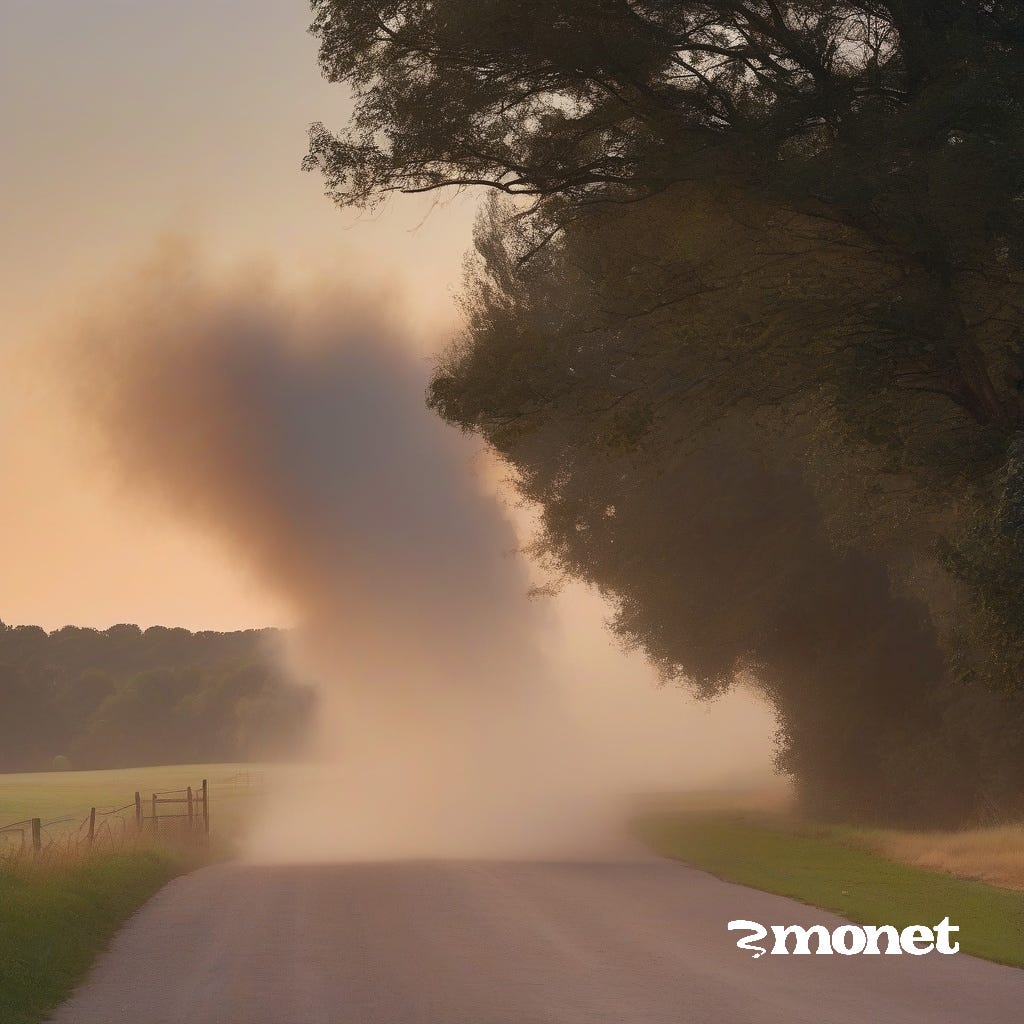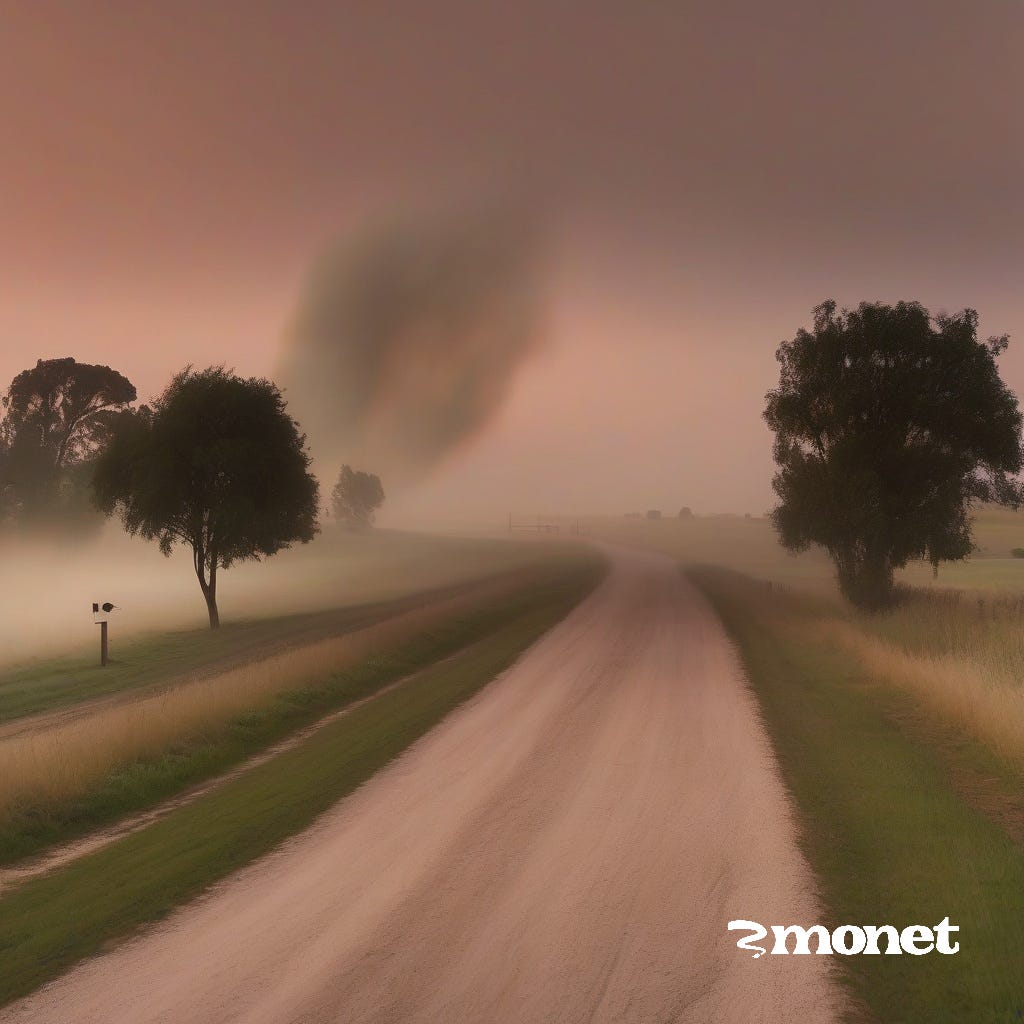“The Dust-Cloud” (1906) by E. F. Benson
The Room in the Tower and Other Stories (1912) by E. F. Benson
Readers who are unfamiliar with “The Dust-Cloud” may wish read my note below after reading the short story.
Listening to a new audio reading of E. F. Benson's 1906 story "The Dust-Cloud" last night, I was struck by the coziness of car rides before the end of the “little epoch.”
[....]The motor came round about eleven, and we started at once, Harry and Mrs Morrison, a cousin of his, sitting behind in the big back seat, large enough to hold a comfortable three, and I on the left of the driver, in a sort of trance—I am not ashamed to confess it—of expectancy and delight. For this was in the early days of motors, when there was still the sense of romance and adventure round them. I did not want to drive, any more than Harry wanted to; for driving, so I hold, is too absorbing; it takes the attention in too firm a grip: the mania of the true motorist is not consciously enjoyed. For the passion for motors is a taste—I had almost said a gift—as distinct and as keenly individual as the passion for music or mathematics. Those who use motors most (merely as a means of getting rapidly from one place to another) are often entirely without it, while those whom adverse circumstances (over which they have no control) compel to use them least may have it to a supreme degree. To those who have it, analysis of their passion is perhaps superfluous; to those who have it not, explanation is almost unintelligible. Pace, however, and the control of pace, and above all the sensuous consciousness of pace, is at the root of it; and pleasure in pace is common to most people, whether it be in the form of a galloping horse, or the pace of the skate hissing over smooth ice, or the pace of a free-wheel bicycle humming down-hill, or, more impersonally, the pace of the smashed ball at lawn-tennis, the driven ball at golf, or the low boundary hit at cricket. But the sensuous consciousness of pace, as I have said, is needful: one might experience it seated in front of the engine of an express train, though not in a wadded, shut-windowed carriage, where the wind of movement is not felt. Then add to this rapture of the rush through riven air the knowledge that huge relentless force is controlled by a little lever, and directed by a little wheel on which the hands of the driver seem to lie so negligently. A great untamed devil has there his bridle, and he answers to it, as Harry had said, like a horse with a fine mouth. He has hunger and thirst, too, unslakeable, and greedily he laps of his soup of petrol which turns to fire in his mouth: electricity, the force that rends clouds asunder, and causes towers to totter, is the spoon with which he feeds himself; and as he eats he races onward, and the road opens like torn linen in front of him. Yet how obedient, how amenable is he!—for with a touch on his snaffle his speed is redoubled, or melts into thin air, so that before you know you have touched the rein he has exchanged his swallow-flight for a mere saunter through the lanes. But he ever loves to run; and knowing this, you will bid him lift up his voice and tell those who are in his path that he is coming, so that he will not need the touch that checks. Hoarse and jovial is his voice, hooting to the wayfarer; and if his hooting be not heard he has a great guttural falsetto scream that leaps from octave to octave, and echoes from the hedges that are passing in blurred lines of hanging green. And, as you go, the romantic isolation of divers in deep seas is yours; masked and hooded companions may be near you also, in their driving-dress for this plunge through the swift tides of air; but you, like them, are alone and isolated, conscious only of the ripped riband of road, the two great lantern-eyes of the wonderful monster that look through drooped eyelids by day, but gleam with fire by night, the two ear-laps of splash-boards, and the long lean bonnet in front which is the skull and brain-case of that swift, untiring energy that feeds on fire, and whirls its two tons of weight up hill and down dale, as if some new law as everlasting as gravity, and like gravity making it go ever swifter, was its sole control. 1
Benson has us look back to animal locomotion for automobile comparison – just as, in the end, "The Dust Cloud" will demonstrate that human subjectivity is the author of tragedy and haunting, experienced by a variety of observers through the variety of their senses.
* * *
Coincidence: this morning, with no thought to last night's enjoyment of "The Dust-Cloud" and its depictions of male friendship, I read the following in Frederic Jameson's 1979 book about Wyndham Lewis, Fables of Aggression:
[....] It is therefore useful to borrow Samuel Beckett’s term for similar character relationships in his own work, and to designate as the pseudo-couple all those peculiar and as yet imperfectly studied pairs in literary history which reach well beyond the twin “heroes” of The Childermass and the familiar Beckett teams of Vladimir and Estragon, Hamm and Clov, Mercier and Camier, through Flaubert’s Bouvard and Pécuchet (and the less articulated pseudo-couple of Frédéric and Deslauriers in L’Education sentimentale) all the way back to Faust and Mephistopheles, and beyond them, to Don Quixote.
The pseudo-couple is masculine; and Jean Borie’s provocative thesis, that the nineteenth-century novel is essentially—even where the novelist himself is technically married—a literature of bachelors, suggests that the male pseudo-couple might be understood as a kind of compensation formation, a curious structural halfway house in the history of the subject, between its construction in bourgeois individualism and its disintegration in late capitalism....2
[Emphasis mine. JR]
There may be heterosexual marriages in E. F. Benson, but shared passions are invariably a male communion. In Benson, there is no literature of the marital. As a matter of fact, Benson may be said, at least by me, to be a laureate of a literary utopia of male friendship and intimacy. "Harry Combe-Martin and I" in "The Dust Cloud" is no exception.
Jay
30 September 2024
https://www.gutenberg.org/cache/epub/72421/pg72421-images.html#page_22
The new audio can be found here: https://youtu.be/NTu5BZvBmmY?feature=shared
Jameson, Fredric. Fables of Aggression: Wyndham Lewis, the Modernist as Fascist. 2008.




